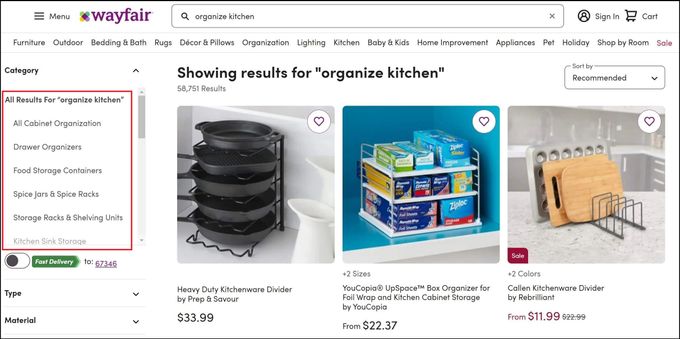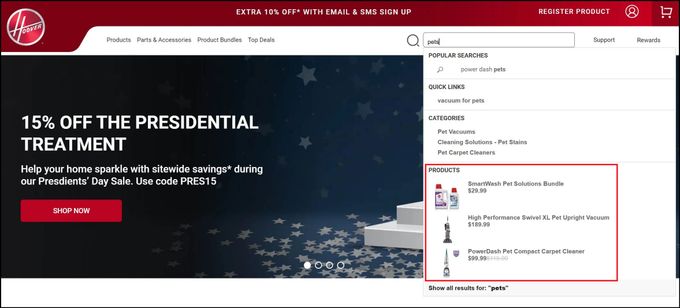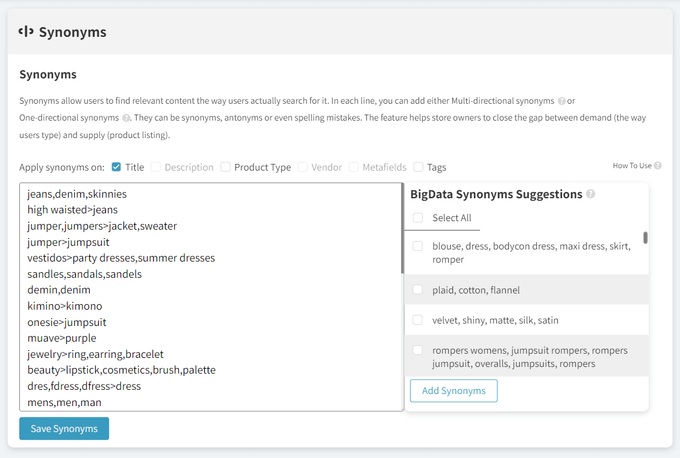A Complete Guide to eCommerce Product Search Engine: Benefits, Features, Tools, & More [2026]
Find out how a product search engine can make it easier for your customers to find exactly what they're looking for.
Updated December 16, 2025

In an age where customers expect a smooth user experience and immediate results, an eCommerce product search engine is a must-have for every online store owner. And, fortunately, this tool is highly accessible—it can be integrated with most major eCommerce platforms, including Shopify Search, BigCommerce Search, Magento Search, WooCommerce, Wix, and more.
By leveraging AI-powered features like autocomplete, full-text search, and visual product previews, these search tools help customers quickly find exactly what they're looking for—leading to higher engagement, lower bounce rates, and increased sales for online stores.
Let's explore the key benefits of implementing a robust product search solution for your eCommerce business and some popular tools you can start using today!
» Leverage advanced product search and discovery to enhance the search functionality of your online stores
What Is an eCommerce Product Search Engine?
An eCommerce product search engine is a "local" site search engine built for your eCommerce store. When a customer types in a query, the engine indexes all of your products and uses sophisticated AI algorithms to help match customers with exactly what they're looking for—fast.
» Here's how to customize Shopify search bar for a seamless shopping experience
5 Key Benefits of an eCommerce Product Search Engine
1. Fast Loading Time
How quickly your site loads is closely connected to customer satisfaction, the site's bounce rate, and ranking. Your customers may feel that your loading time is a reflection of your service and quality. So, the faster your site loads, the less likely customers are to leave. This keeps your bounce rate down (an average of 9%) and helps to boost your search engine ranking.
Ideally, your eCommerce store and its product search functionality should load in 2 seconds to ensure your customers quickly find what they're looking for.
» Discover the power of AI in eCommerce site search
2. Autocomplete Text
Autocomplete text is an AI feature that aims to finish your customer's query as they're typing it. This gives them a quicker path to your product, requiring fewer keystrokes to get to their end goal. It also helps to prevent spelling errors, which can alter their search results and provide a less-than-ideal user experience.
» See these eCommerce site search best practices
Example: Ruggable
When a user types "ze" into the search bar, the product search engine automatically pulls results for zebra-related items. This helps to cut the time the user spends searching, sending them straight to their results.
» Learn how AI can optimize your customers' eCommerce experience
3. Full-Text Search
Sometimes, your customer may know exactly which product they want. But often, this isn't the case. Search queries fall into four types:
- Exact product search: Your customers know exactly what they need, down to the product's name.
- Product type search: Your customers search for a general product, not a brand or model.
- Problem-based search: Your customers need a solution to an issue, but they're not sure which form it comes in.
- Non-product search: Your customers are looking for information, not a product.
» Discover the difference between product search and product discovery
Full-text search is a helpful feature when your customer hasn't entered an exact product search. It compares every word in your customer's query against your database(s), helping to fill in the gaps where the query lacks specificity or precision.
Example: Wayfair
In this example, a user might type the problem-based search "organize kitchen." Wayfair's eCommerce product search engine returns multiple types of organizers, dividers, and racks to solve the problem.
» Not sure where to start? You'll need a great site search software tool
4. Product Images In-Search
Images are non-negotiable when it comes to convincing your customers to convert. Customers need to see the item to visualize if it's what they're really looking for. When your website contains images within search engine results, it speeds up the shopping process, allowing customers to find what they're looking for in seconds instead of minutes.
» Images are essential to great merchandising. See our guide to eCommerce visual merchandising
Example: Hoover
On Hoover's website, a user can type in "pets" and see multiple product suggestions as well as photos and prices—all right from the search bar dropdown.
This completes a mini product preview, providing at a glance all the key decision-making information they need.
» Find out how AI visual discovery can inspire your shoppers to buy
5. Synonyms and Natural Language Processing (NLP)
It's rare that your customer will be able to search for a product verbatim as it's listed on your website. If your product search engine doesn't include synonyms, they may be served "no search results" pages when that's not truly the case. Synonyms help to give your customers as many options as possible by showing results based on similar terms.
» Learn more: Decoding natural language search
Example:
You can fine-tune your product search engine to display jumpsuits when your customer types "jumper" or denim if they misspell it as "demin." You can make searches more specific or general, like showing rings and bracelets when your customer types "jewelry."
What Should You Look for in an eCommerce Product Search Tool?
There are many search engine tools available for eCommerce store owners, each with its own pros, cons, and specific features. It's up to you to decide which one fits your store best, but you should ensure that whichever option you go for offers the following features:
➤ Extensive search functionality: Your eCommerce search engine tool should have a range of relevant features, such as AI-powered autocomplete suggestions, merchandising features, visual and voice search capabilities, and natural language processing (NLP).
➤ Customizable features: You want your search engine tool to be fully customizable so that it matches your store's overall brand design. This will help you maintain the consistency of your user journey.
➤ Integrations: Ensure that your tool can integrate easily with your chosen eCommerce platform.
➤ Personalization: Most eCommerce customers now expect a personalized shopping experience, so your search engine tool should be able to provide more relevant and personalized search results based on their demographics and previous shopping history. eCommerce personalization software is a must-have.
➤ Speed and scalability: Poor website loading time is a surefire way to chase customers away and increase your bounce rate, so you'll need to ensure that your search tool maintains fast and efficient results at all times, including traffic surges, and will maintain this speed as your store scales in size.
➤ Tags and filters: Not only should your search tool be able to handle natural language and extensive queries, but it should also give customers the ability to refine their own search with popular tags and filters such as price, size, brand, and more.
➤ Mobile optimization: With so many customers doing the majority of their online shopping through mobile phones, it's essential to ensure your website and search functionality are optimized for mobile and mobile apps.
➤ Analytics: Customer search data can be a great way to identify new selling opportunities and product ideas. Make sure your tool can provide you with eCommerce site search analytics in a way you can understand.
Take the Fast Way
To capture today's online shoppers, your eCommerce product search engine needs to match your competitors in terms of speed, flexibility, and problem-solving. The features and tools we've discussed here can supercharge your user experience, earning loyal customers and predictable revenue.
» Ready to get started? Schedule a demo with Fast Simon










